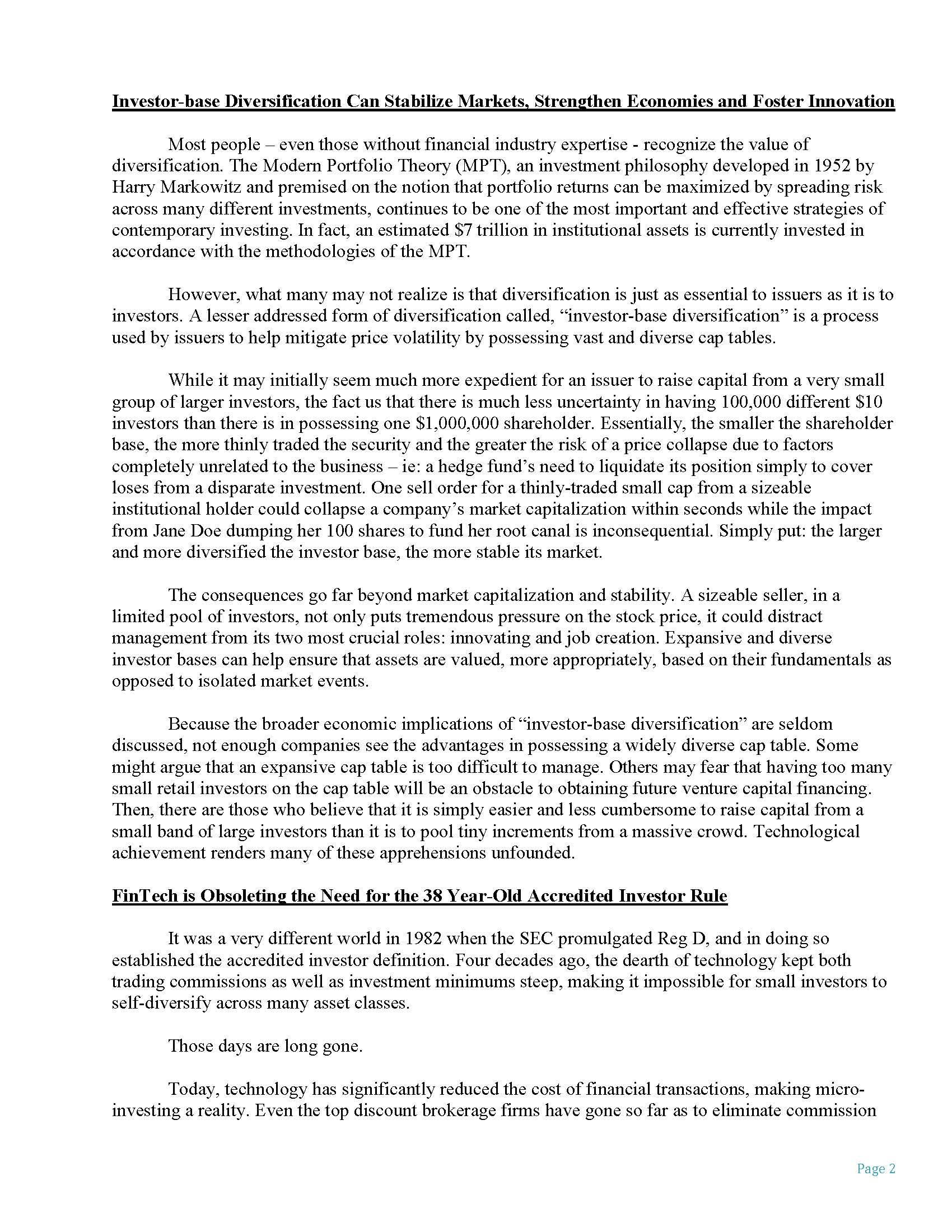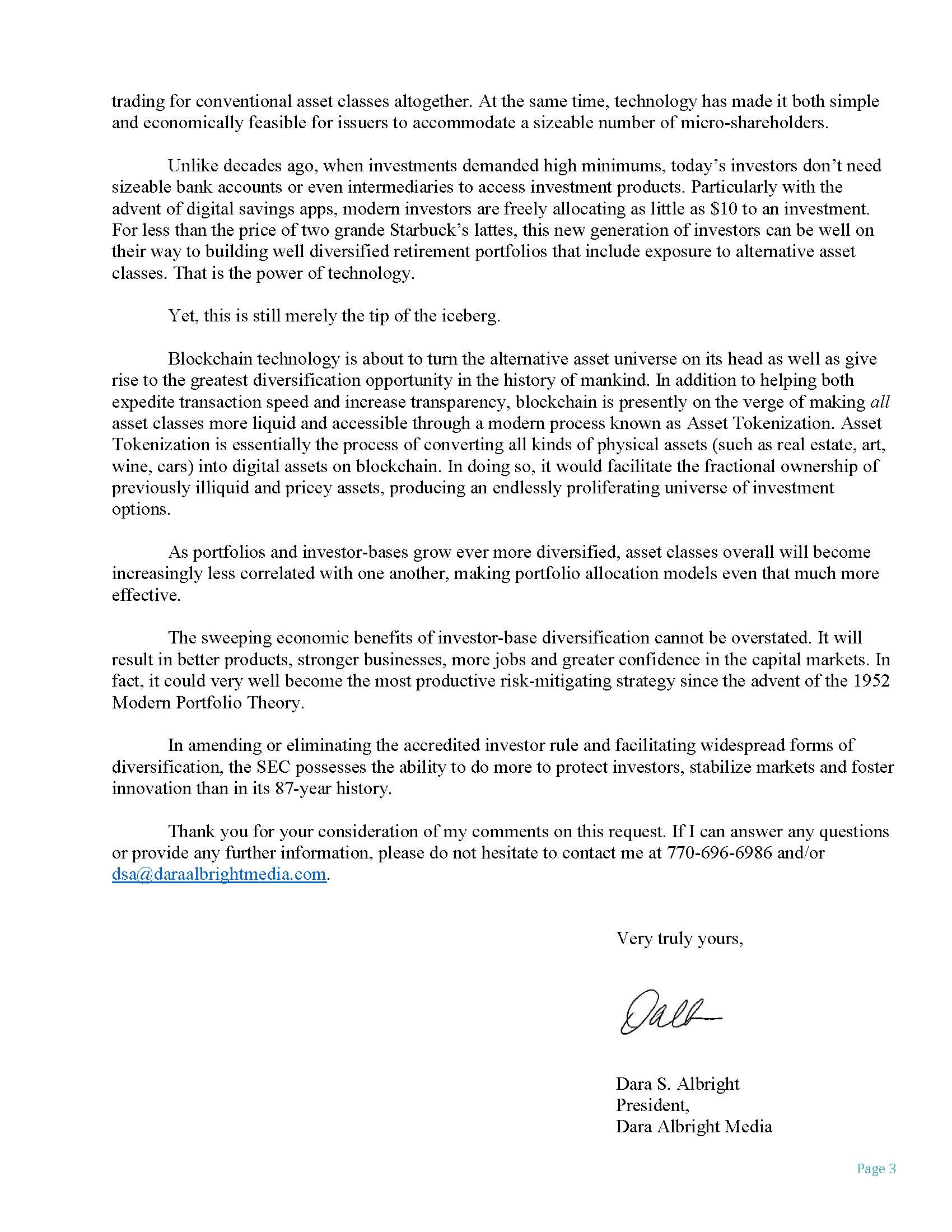A Bill Just Passed the House that Could Have Epic Implications for Fintech and Cryptocurrencies
A bill that would have epic implications for fintech - cryptocurrencies in particular - just passed the House by an overwhelming bi-partisan majority of 383-18. And barely anyone in the fintech industry is even talking about it.
H.R. 2797, also known as the Equal Opportunity for All Investors Act, would permit all Americans, regardless of economic status, the liberty to invest their own money as they deem fit - so long as they pass an exam demonstrating their understanding of various securities and investing risks.
You’re probably thinking, “Doesn’t every American already possess the freedom to spend one’s own money as one pleases?”
Nope. Not when it comes to spending money on investment products.
Now, if want to spend your money on blackjack, sex or drugs, America does have States that will allow that. In fact, in Nevada, gambling, prostitution and buying weed are all legal. But don’t dare try to raise capital for your business from the crowd in Nevada! According to NASAA, Nevada is one of a very small number of States that has yet to legalize intrastate crowdfunding.
In the nation - created on the mantra that all are entitled to life, liberty and the pursuit of happiness - only its wealthiest few, known as “accredited investors”, are truly free to invest their money where they like.
Under current U.S. securities rules, accredited investors are restricted to those with annual income over $200,000 (individually) or $300,000 (with spouse or partner) in each of the prior two years; or have a net worth of more than $1 million (excluding the value of their home); or are considered qualified investment professionals.
Only about 10% of American households currently meet the criteria for accredited investor status. This means that 90% of American households are not afforded the same opportunities to amass wealth and mitigate risk through diversification as America’s privileged ten percent.
It is no coincidence that America’s wealth disparity, between the top 10 and bottom 90 percents, began spiking in the 1980s - shortly after the SEC promulgated the accredited investor rule.
Lawmakers may have had noble intentions, in the 1980s, when they carved out an exemption for companies to skip the registration process and raise capital directly from accredited investors. But, sometimes even the best of intentions lead to economic hell.
Instead of facilitating capital formation and protecting investors, the accredited investor rule ended up harming both. It resulted in more companies remaining private, thereby appreciating in the coffers of venture capital firms - instead of in the retirement portfolios of American workers.
Worse, as the rules were relaxing for the accredited elite, the registration process had become increasingly more expensive and cumbersome. As a consequence, small companies were priced out of the public markets and small investors were cheated out of portfolio growth.
What emerged in America, four decades following the passage of the accredited investor rule, is an inequitable capital markets system where the nation’s poorest 90% are made to serve as the exit strategy for its wealthiest 10%.
By shifting from a class-based to a knowledge-based accredited investor definition, the Equal Opportunity for All Investors Act would bring a level of fairness to the markets not seen in decades. The Act could also help resolve many of the grave macroeconomic challenges that America is presently facing.
I implore you to read my 2020 comment letter to the SEC (also posted below for convenience) to understand how broadening the accredited investor definition (or even eliminating the rule altogether) would lead to narrower wealth gaps, better consumer products, stronger businesses, more jobs and greater confidence in America’s capital markets.
It would also behoove the cryptocurrency industry, in particular, to throw its support behind H.R. 2797 as this bill could help shield against unjustified SEC attacks.
Under the Gensler regime, the SEC has been gunning for the crypto industry. The commission has made it impossible for crypto-related endeavors to partake in America’s capital markets system by stonewalling crypto-related qualifications and weaponizing its power to enforce nonexistent rules. The SEC’s actions have accomplished nothing but push innovation and jobs overseas while destroying the wealth of the very investors that it claims to protect.
H.R. 2797 opens a path for crypto projects to sell tokens to small investors without fear that the SEC will bring an enforcement action against them for unregistered offerings - so long as those investors have passed the qualifying exam.
While H.R. 2797 is giant leap in the direction of democratization, the legislation isn’t perfect. Most notably, the bill entrusts the SEC to design the exam “with an appropriate level of difficulty such that an individual with financial sophistication would be unlikely to fail.”
The vagueness of this sentence is worrisome. Leaving the interpretation up to the federal agency that has been hell-bent, in recent months, on decreasing - not increasing - the number of accredited investors doesn’t make much sense. Nor does turning over the exam creation to an organization that derives its revenue through registrations as well as enforcement actions that allege unregistered securities offerings. Because of these revenue streams, the SEC has an economic interest in keeping the number of accredited investors as low as possible. And, it could do just that by designing an exam that is too difficult for most people to pass.
Given that an arduous certification exam would defeat the entire purpose of this bill, a more impartial exam creator is needed for this legislation to succeed.
That said, should the SEC use this as an opportunity to create an onerous exam that excludes many from freely investing their own money, I pledge right now to establish a non-profit organization that will provide free “accredited investor exam” tutoring services to anyone. I will make it my mission to ensure that every single American becomes an accredited investor.
All Americans deserve equal rights when it comes to spending one’s hard-earned money. If the government could allow the purchase of casino chips, ganja and some stranger banging, it can certainly permit the puchase of alternative assets!
Kudos to Rep. Mike Flood for sponsoring this bill that takes America one step closer to equitable spending rights, and thanks to all 383 congresspeople who voted for it. But, in case you are wondering, here is a list of the 18 congresspeople who, by voting against it, would apparently prefer you acquire an STD than obtain an investment return!










